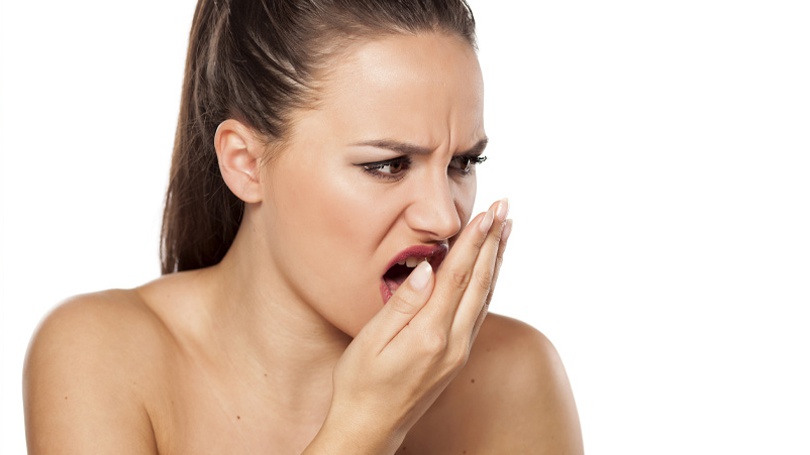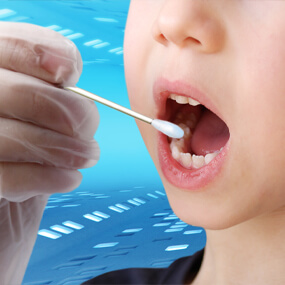The Causes of Bad Breath and What You Can Do About It

Bad breath is something everyone deals with on occasion, but for some people, it is a problem that persists despite their attempts to correct it. In fact, about 30 percent of the population is concerned with their bad breath. This condition also goes by the name halitosis—which is Latin for bad breath—and is often present in the morning or after eating a garlic-heavy meal. Temporary halitosis can also be caused by drinking coffee or alcohol, smoking cigarettes, chewing tobacco, and so forth.
People are often unaware of their bad breath until a family member, friend, or coworker tells them about it. Such conversations can be quite embarrassing and even stressful. If the halitosis is severe, it can affect relationships negatively and reduce a person’s quality of life in other ways.
What Causes Bad Breath? What Can You Do About It?
Bad breath can originate outside of the mouth as well as from within. The usual cause is bacteria that has accumulated on the teeth, gums, and tongue. In addition to poor oral hygiene, halitosis is also associated with gingivitis, periodontitis, and dry mouth. Dry mouth occurs when the salivary glands cannot create enough salvia to maintain a moist mouth. A dentist can rule out gum disease and help a patient identify the other issues that could be causing the bad breath.
There are other health conditions that can result in bad breath, such as tonsillitis. Respiratory infections, such as bronchitis and sinusitis, can cause it as well. Gastrointestinal diseases sometimes result in halitosis. Halitosis is often a symptom of untreated diabetes as well as advanced kidney and liver disease, but in these cases, there are usually even more severe symptoms that warrant medical attention.
Common Causes of Bad Breath
- Food—Food particles in your mouth will break down, which results in bacteria that can create a foul odor. Certain foods can cause halitosis before they break down: garlic, onions, and spices. This happens because they are digested, enter your bloodstream, and are carried to your lungs.
- Tobacco—Tobacco smoked, chewed, dipped, or otherwise used orally will cause bad breath. Tobacco use also leads to gum disease, which will further exacerbate any halitosis.
- Poor dental hygiene—If you skip brushing, flossing, and rinsing, food particles remain in your mouth and continue to break down. These bacteria lead to plaque, a sticky film that accumulates on your teeth. Plaque will irritate the gums and eventually become tartar, and your tongue can also retain bacteria. Dentures can lead to similar problems without regular cleaning and a proper fit.
- Dry mouth—Saliva removes many of the food particles that lead to bad breath. Xerostomia is dry mouth that occurs due to a reduced or absent flow of saliva. Dry mouth while you sleep is natural, which is why morning breath happens, and it can be worse for those who sleep with their mouths open. Chronic dry mouth is often a symptom of salivary gland problems and certain diseases.
- Medications—Some medications cause dry mouth, which then leads to bad breath. Other medications release chemicals that are carried to the lungs and thus affect your breath.
- Infection—Infections in the mouth can cause bad breath. This can include tooth decay, gum disease, and oral sores, but it can also occur due to surgical wounds, such as from a tooth extraction.
Diagnosis
It is common for a dentist to smell the breath from your mouth as well as your nose and rate it based on a scale. A dentist may also scrape the tongue and evaluate that odor. If necessary, a detector can be used to determine which chemicals are responsible for the halitosis.
Treatment
To prevent bad breath as well as avoid gum disease and tooth decay, you should adhere to an oral hygiene regimen as advised by your dentist. If that alone is not enough to control the bad breath, your dentist will identify the causes and recommend treatment. In cases where an underlying health condition is the cause, your dentist may refer you to your primary physician or a specialist.
Recommendations from your dentist may include:
- Mouth rinses and toothpastes—When bad breath is the result of plaque accumulation, your dentist may recommend a rinse formulated to kill the offending bacteria. Dentists will often recommend a toothpaste that contains an antibacterial component that can destroy that bacteria as well.
- Dental disease treatment—If you have periodontitis, your regular dentist may refer you to a periodontist, a gum specialist. As your gums withdraw from your teeth, odor-causing bacteria accumulates in the pockets created, and this often requires professional cleaning. Your dentist may also recommend fixing faulty tooth restorations, which also serve as a seat for such bacteria.
Lifestyle Habits to Avoid Bad Breath
In order to reduce or avoid bad breath, it is recommended that you:
- Brush twice a day—The modern recommendation is to brush in the morning and before bed. Brushing after every meal is outdated advice and can have a negative effect on your tooth enamel. Vigorous rinsing with water after every meal is preferred. Choose a toothpaste that contains fluoride, and if you are experiencing bad breath, an antibacterial toothpaste can help combat the odors.
- Brush your tongue—Your tongue traps bad bacteria as well, so brushing it can reduce halitosis. If your tongue is coated due to dry mouth, smoking, or another reason, use a scraper rather than a brush.
- Floss twice a day—Flossing is important to remove food particles and plaque from between the teeth. This helps to avoid the bacteria that causes bad breath as well as tooth decay.
- Use a mouth rinse—Use a mouth rinse twice a day after brushing. Note that rinsing only disguises chronic bad breath and does not cure it. You can rinse more often with water, and if you want to freshen your breath in the process, consider adding peppermint oil drops.
- Clean dentures and other dental appliances—If you wear a bridge, denture, or other dental appliance, you should clean it once a day or more often if directed so by your dentist. Mouth guards and retainers should be cleaned prior to placing them in your mouth, and your dentist should recommend the cleaning product that you should use.
- Avoid tobacco products—While it may be easier said than done for those addicted to them, it is very important that you quit using tobacco products not just for your breath but your oral health as well as your overall health. As for bad breath, tobacco causes dry mouth and leaves a lingering odor all its own.
- Drink water throughout the day—Need another reason to adhere to the common recommendation of eight 8-ounce glasses a day? Your breath is a good one. Regular consumption of water helps keep the mouth moist, and it washes away those food particles that lead to bacteria.
- Enjoy crunchy, healthy snacks—Your snack choices should involve fruits and vegetables like apples, carrots, and celery. Eating such snacks encourages saliva production. They also help avoid bad breath from hunger, which happens as acids build up in your stomach.
- Monitor your diet—Avoid garlic and onions when the bad breath would be embarrassing, and you have no way to deal with it. Limit your intake of sugary foods, which are also linked to bad breath.
- Replace your toothbrush regularly—Toothbrushes should be replaced every three months or so. Choose a soft-bristled brush, and store it in an appropriate holder. Antibacterial options are available as well.
- Schedule regular dental checkups—Seeing your dentist at least twice a year for a cleaning and exam is the best way to ensure optimal oral health and, thus, great breath. If you are experiencing chronic halitosis, then schedule an appointment with your dentist right away. If your dentist believes that your bad breath has a cause other than your mouth, then you should follow any advice concerning seeing your primary physician or a specialist as soon as possible.
Take Control of Your Breath
Bad breath is not only embarrassing but can indicate a more serious problem. Regular brushing, flossing, and rinsing is a great starting point, but you should see your dentist at least twice a year to get an exam and eliminate plaque and tartar. Jeffrey D. Clark, DDS, is a leading cosmetic and restorative dentist. Dr. Clark and his entire team at Scottsdale Cosmetic Dentistry Excellence welcome the opportunity to help you enjoy great breath and your perfect smile. Call us at 480 585 1853 to learn more and schedule an appointment.




